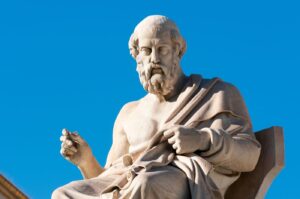The late Whittaker Chambers, the Soviet spy turned conservative Christian who went on to become America’s most stirring voice against Communist tyranny and Marxist-Leninist atheism, once wrote:
Those who remain in the world, if they will not surrender on its terms, must maneuver within its terms. That is what conservatives must decide: how much to give in order to survive at all; how much to give in order not to give up the basic principles. And, of course, that results in a dance along a precipice. Many will drop over, and, always the cliff dancers will hear the screaming curses of those who fall, or be numbed by the sullen silence of those . . . who will not join the dance.
It was considerations of this kind that went through my mind when I wrote the Public Discourse essay on the dilemma of the Christian shopkeeper whose strongly held moral and religious convictions clashed with newly enacted laws requiring vendors to serve homosexual weddings. I tried to offer practical advice to such troubled merchants, encouraging them not to abandon their moral convictions nor retreat into a “sullen silence” that accepts without protest the dictates of what they believe to be an unwise and unjust law.
I suggested at least three possible courses of action—all of them commendable—that they might take: (1) cease to serve weddings of all kinds; (2) go out of business and find a new line of work; and (3) express a reluctant willingness to participate in such weddings, while publicly protesting and explaining why laws compelling service at such weddings are wrong and asking for public support for their repeal.
The first two choices have been suggested by many people before. The third choice was my own contribution. With it, I hoped to expand the options for those conflicted souls who oppose same-sex marriage yet do not believe it is an issue of the same level of moral gravity as abortion, and as such not weighty enough under most circumstances to warrant the termination of one’s business.
Start your day with Public Discourse
Sign up and get our daily essays sent straight to your inbox.Dr. Jeffery J. Ventrella of the Alliance Defending Freedom has read my piece carefully and offered his own extended critique of some of my ideas. As best I can tell, he approves of the first two options I suggest for the troubled shopkeeper, but not the third. In the limited space that I have, I will try to answer his main objections.
Marriage consists of the conjugal union of one man and one woman. That is its ontology, what it is. Calling something else “marriage” in word and then confirming it by action and ritual presupposes a mistaken view of reality.
The contemporary call for same-sex marriage, polyamorous and polygamous marriage, time-limited marriage, “open” marriage, and the like may involve a mistaken view of reality, but I don’t think the mistake is best characterized as a mistaken ontology. I believe it involves a mistaken view of human nature, of human psychology, and of what best contributes to human happiness and human flourishing. Most of all, it involves a mistaken view of the chaotic nature of male sexual psychology, and of the necessary means by which that chaotic nature is tamed, civilized, and channeled into constructive family formation, mutual assistance of spouses, and healthy child-rearing structures (this latter series of problems is brilliantly analyzed in a popular format in George Gilder’s incomparable Men and Marriage).
Dr. Ventrella, along with many of my comrades-in-arms in the struggle against the sexual revolution and the many nutty ideas it has bequeathed to America, seems to accept the view of marriage as an a priori cognizable Platonic Form. But I don’t believe there is any such a priori cognizable marriage form that can be determined simply by reflecting on the meaning of a word in the public language. Even if there were such a form, I would still ask whether, if institutionalized, this ideal form would contribute to human flourishing more than alternative ways of organizing intimate, associational, procreative human relationships. If it were not better on pragmatic-consequentialist-human-flourishing grounds—the “fruits test” of Matthew 7:17—then I would reject the Platonic Form of marriage as a cultural ideal in preference to whatever ideal proved superior on these stated grounds. Empirically informed, consequentialist pragmatism, not a priori philosophical musings, is what should be the acid test here. The “ontology of marriage” argument, I believe, involves a misguided attempt to assert the equivalent of a “thus saith the Lord” imperative for a form of human organization that is the product of long historical experience and whose justification is to be found exclusively in the many social, spiritual, and economic goods that it has brought about.
Where Ventrella and I would no doubt agree is that there are concrete harms involved in expanding the public meaning attached to the word “marriage” by broadening the concept to include same-sex relationships, time-limited relationships, polyamory, and the like. The word “marriage”—and the venerable custom to which the word attaches—has developed a rich symbolic meaning over the centuries because of its central importance to a just and decent society. This rich, multi-layered meaning has helped direct people— especially young people—to structure their lives in ways that are meaningful, fruitful, and life-enhancing. Unilateral, no-fault divorce laws have already done great harm to the public meaning of marriage by weakening the idea of the marriage bond as a lifelong commitment. We surely do not need further erosion and weakening of what remains of this valuable public meaning by expanding the concept in the multiple ways that marriage revisionists want.
This “yes/no” solution [obeying the law but only under public protest and with a call for the law’s repeal] requires [business owners] to publicly embrace inconsistency, if not actual hypocrisy. Mom and Pop’s reputation can only plummet in such circumstances.
This seems to me the opposite of the case. Small business people are notoriously accommodating when money and clientele are at stake. “The customer is always right,” and “never discuss politics or religion” are time-honored maxims that are employed to avoid controversy and offending potential customers. A business owner who announced publicly (1) his moral or religious objection to same-sex marriage; (2) his belief that a SOGI law requiring him to serve such a marriage ceremony is unjust and in need of repeal; (3) his wish that same-sex marriage customers go elsewhere with their business; and, finally, (4) his willingness to comply with the law only under protest, would hardly be understood as playing it safe in terms of his commercial interests. Rather than being perceived as a hypocrite or coward, people would probably see such a stance as unusually principled and courageous.
The more typical response to SOGI laws, even by many serious Christians and Jews, will be grumbling and recrimination. If refusal to serve same-sex weddings might cost a small businessman his business, the final outcome in most cases would be silent compliance and surrender. My proposal offers an alternative to this likely outcome. Those taking this option would more likely be viewed as moral leaders than hypocrites or cowards.
There can be no “accommodation” for an unjust law. One can accommodate stupidity but not inherent injustice. As [Martin Luther King] rightly noted . . . [quoting St. Augustine] “An unjust law is no law at all.” . . . [King] knew he needed to act according to his well-formed conscience, come what may . . .
Like the nonviolent protest movement of Mohandas Gandhi in India, the related civil disobedience campaigns of people such as Martin Luther King, Jr., and Rosa Parks in America in the 1950s are rightly seen as historical high points in the understanding of human dignity and the struggle for human rights. Thomas More, Dietrich Bonhoeffer, and Maximilian Kolbe, whose names Ventrella mentions in this context, engaged in self-sacrificing actions in defiance of injustice and are rightly honored as saints and heroes. But for ordinary people, under ordinary circumstances, life is not a stage for the practice of heroic action. Not only are situations calling for moral heroism mercifully rare, but even in extreme situations, such as those faced by Kolbe (who sacrificed his own life to save from Nazi execution a family man responsible for the care of young children), what is heroic is, by definition, not morally obligatory. We honor people such as Kolbe precisely because they have chosen to act “above and beyond the call of duty.”
It must be remembered, too, that Rosa Parks and MLK refused to obey the southern segregation laws as part of a public campaign of civil disobedience intended to get those laws changed. They never contended that all those black people in decades past (including themselves in earlier times), who had no alternative to public transportation as a means of getting to work, and as a result dutifully got to the back of the bus to conform to the existing segregation ordinances, were thereby doing serious moral evil. The moral evil involved was that of the segregation laws and those who supported them, not those reluctantly forced to conform to them.
Even if one considers conformity to an evil law an additional moral evil, a prudent person will weigh the moral harm done by such conformity against the consequences that would result from the inability to support oneself and one’s family. Life often requires such weighing, balancing, and compromising.
Within the overall complexity of human affairs, Ventrella seems to lack an appreciation for the kind of practical wisdom and balanced moral judgment that Aristotle called phronesis and Aquinas prudentia. In the real world, human goods are often in conflict with one another. This reality forces us to make difficult choices and trade-offs that cannot be eliminated nor adjudicated by following a simple rule (like “no accommodation for an unjust law”). Moral maturity requires an understanding of these conflicts and trade-offs and the ability to apply moral principles and wise moral judgment to the complexities of human life. Cowardice and equivocation must be avoided in such situations, but so too must fanaticism and unreflective dogmatism.
Are the situations morally different between a health-care provider [assisting at an abortion] and a business owner [servicing a same-sex wedding]? . . . Each person would be disintegrated if he acts against his conscience. . . . The same disintegration occurs because both facilitate inherently immoral activity.
I may not have understood Dr. Ventrella here, so extreme does his view appear. He seems to me to be saying something like “Breaches of conscience are breaches of conscience, and the degree of moral disintegration to the personality remains the same regardless of the degree of wrongness of the action done.” If this is Dr. Ventrella’s view, I can only say that we clearly have very different moral intuitions on this issue.
Like many Americans in the strong “right-to-life” camp, I consider the taking of an innocent human life in an abortion, under most circumstances, to be one of the most evil things a human being can do in this world. It transgresses an absolute “No!” Being a vendor at a same-sex wedding is in my view an order of magnitude less grave than assisting in an abortion or an infant murder. And the degree of harm done to one’s moral integrity (or to use an older idiom, the harm done to one’s soul) is correspondingly different in the two cases— enormously different.
In today’s hostile legal environment, posting what Nieli proposes could well expose Mom and Pop to a charge of “animus”. . . The SOGI laws are designed to silence the messages such a sign would convey. It is naïve to think that such postings would be allowed to exist for long . . .
I cannot predict for how long our First Amendment rights will be protected, but for now, expressing one’s views about the injustice of a law would receive the highest level of constitutional protection. This is “political speech,” and virtually all of the current justices of the US Supreme Court believe that this kind of speech must be subject to the strictest of strict scrutiny protection. Even if, under the “hostile work environment” exception, a workplace sign of protest were prohibited, nothing would prevent a business owner from taking out ads in local media publicly announcing his conscience-based objections to serving same-sex weddings. This would not only avoid the despair of “sullen silence” that Whittaker Chambers warned us against, but would surely divert most gay-wedding customers to alternative vendors. And such newspaper and media ads would receive near-absolute constitutional protection.
In the future, I suspect that courageous organizations such as the Alliance Defending Freedom will continue to be able to provide the effective litigation muscle to defend the free speech rights of religious folks threatened by government censorship. I am apparently more optimistic on this score than Dr. Ventrella.










